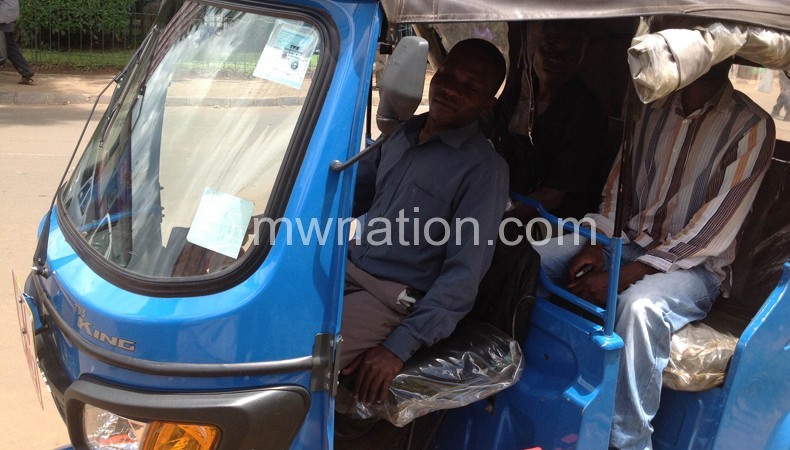Motor tricycles squeeze taxis out of business
Malawi’s capital city, Lilongwe, is abuzz with money-spinning activities. However, in the same city, a section of entrepreneurs is silent and sad. Their machines too are silent and rarely contribute to any noise engulfing the city.
Sitting in the comfort of their saloon vehicle seats, time and again, their heads rest on steering wheels, or adjusting their seats for a nap. Completely confused, they are always anxious of what life will be like in the next two years.

These are the many taxi drivers in the capital city who are, slowly but truly, being pushed and squeezed out of business by tricycles that have stormed the city with a bang, rendering taxi operators destitute.
“I have withdrawn my daughter from a high school and my life has gone down in my family to the extent that I cannot even afford a loaf of bread. I usually park my car within the city when knocking off because I cannot manage burning fuel to and from my home every day. We have completely lost business to these tricycles,” said Allan Kastom who operates his taxi business at Shoprite in Lilongwe’s Old Town section.
The coming of tricycles, popularly known as ‘Tinjinga’ among the city dwellers, has seen a lot of people flocking to them for transport within the city. The tricycles that are in different colours have attracted a lot of commuters due to their convenience, lower fares and probably design.
Kastom, who naturally has no kind words for the tricycles, says business for taxis has drastically dwindled as very few people opt to hire them, with many going for ‘Tinjinga.’
He said: “Many of my friends who were employed as drivers in the taxi business are [now] jobless because their masters could not believe them going empty handed every day. Most of us who cling to the business are taxi owners who have no option for our livelihood but stay in the doomed business whose future is not certain.”
A tricycle, which normally picks three passengers and charges K150 from Lilongwe Shoprite to Kamuzu Central Hospital (KCH) is a darling to many as they are too cheap compared to taxis which demand from passenger three or more times the tricycles’ fare.
Lilongwe residents find the tricycles convenient than a taxi which is said to be expensive because it costs not less than K1 000 for any short distance within the city.
The passengers said they are assured of safety in tricycles as there is always company unlike taxis which mostly pick one person to his or her destination which sometimes becomes risky, especially to women.
“Most taxi operators cannot be trusted. There are a lot of robbery stories concerning taxis, where people have lost their properties and even lives. The tricycles have come at the right time,” said a lady shopper at Game Store in Lilongwe.
As the taxi operators are crying for the hard times in business, their counterparts, the ‘Tinjinga’ operators are singing songs of joy and praises for the coming of the tricycles.
“Since I was employed as driver on this tricycle, my life has changed. I can feel the air of glory in this city. Am able to support my family and initiate different small developments at family level using the money realized from this business,” said Willard Mponda who commutes between Shoprite and KCH.
Mponda says the tricycle business is hot and fast.
“We do not take [more than] five minutes before we get customers. Sometimes we even miss lunch because we don’t have time to park and look for food to eat,” he said.
At the end of every month, Mponda gets K20 000 as salary from his Lebanese employer.
He said most of the Tinjingas in town are not owned by indigenous Malawians, they are owned by foreigners mostly Indians and Lebanese. The foreigners employ Malawians to operate the businesses for them.
Mponda says the tricycles came as cheap motorcycles on the market but due to demand on the road, they were hiked to K2.2 million that most Malawians find hard to purchase.
The tricycle operator proudly said on a good business day he goes back to his employer with a good K20 000 cash, equivalent to his salary and not less than K10 000 on a bad day.
But as Mponda celebrates the invention of ‘Tinjinga’, there are two threats ahead. The first one being traffic police who insist that the tricycles are meant for two passengers.
He confided that discussions are under way between traffic police, the Department of Road Traffic and Safety Services and the operators on how many passengers should the tricycles be carrying.
“If they agree on two passengers then, we are out of business too like our friends, the taxi operators, because our strengths are on number of passengers that we carry,” says Mponda.
Ironically, Kastom and other taxi operators interviewed, bank their hope on Road Traffic Directorate.
“We are hoping that the directorate will soon pounce on these and enforce that they operate within the road traffic laws. They overload and operate illegally, but nothing happens. We are sure the laws will work on them if the officers there, are not corrupt. We Malawians need to be in this business and not foreigners as it is the case now,” said Bright Chimvula, chairperson of taxi operators at Constantine in Lilongwe.
Chimvula says the tricycle business should be in the hands of Malawians and that government should check why mere tricycles were hiked to K2.2 million.
As the taxi operators wait for their time for joy after intervention from Malawi Government law enforcers, tricycle business continue to flourish and expand to districts, making the taxi operators more vulnerable and destitute.





